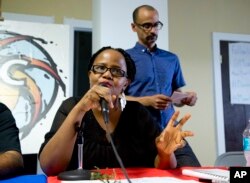Haiti is preparing to receive hundreds of thousands of migrants deported from the Dominican Republic by road.
The Martelly government announced it has taken the necessary measures to receive the migrants returning home.
A 2013 Dominican citizenship law aims to cut off more than 200,000 Haitians who were born in the country to undocumented Haitians.
The decision leaves them without legal documentation and stateless since they have neither Haitian nor Dominican citizenship. They are now subject to deportation.
Although it was first feared that the deportations would begin on June 25 after the law went into effect, the Dominican government has now clarified that repatriations would be a slow and gradual process with "no sudden surprises."
Earlier this week, Haiti's Prime Minister Evans Paul said he did not know exactly when the Dominican Republic would begin deporting Haitian migrants. Paul said the Dominican Foreign Affairs Minister Andres Navarro had reassured him there would be no "mass deportation". Hundreds of Haitians have already begun returning to Haiti voluntarily.
But Senator Jean-Baptiste Bien-Aime, who represents the Department of the Northeast in Parliament told VOA he is worried that the Martely government is not ready to receive the migrants.
In an interview with VOA's Creole Service in Washington, Haitian industrialist and presidential candidate Carl Henri Baker criticized the Dominican law as "illegal and unconstitutional" .
"My message is this: First, this law they [the Dominican Republic] passed to deport Haitians who don't have citizenship - get rid of it - it's illegal, it's unconstitutional - even in the Dominican Republic," Baker said. "And I'm asking the international community to pressure the Dominican government to rescind this law."
In Port-au-Prince, presidential candidate Clarens Renois called for solidarity among all sectors of society to assist the returning migrants.
Miami protest
Meanthile in Miami, two U.S.-based authors with roots in Hispaniola (the island where the Dominican Republic and Haiti are located) are urging a range of protests against the deportations of migrants from the Dominican Republic.
Dominican-American writer Junot Diaz and Haitian-American writer Edwidge Danticat rallied Wednesday night with about 150 activists and community members in Miami. They called for political pressure, travel boycotts and consumer choices over items such as sugar to strip power from the governments and corporations benefiting from a policy that they say targets black migrants.
VOA's Creole Service contributed to this report. Some material for this report came from The Associated Press









